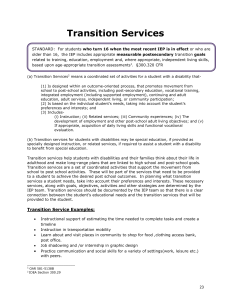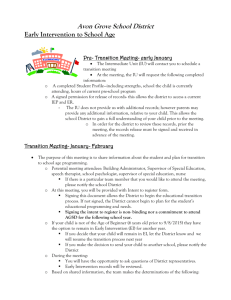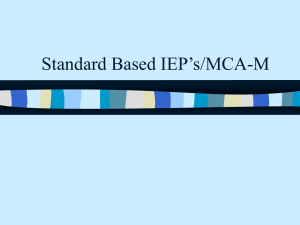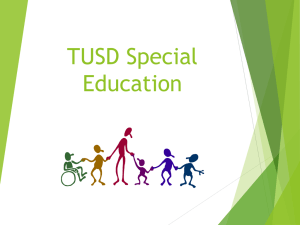Our Vision of Excellence in Special Education
advertisement
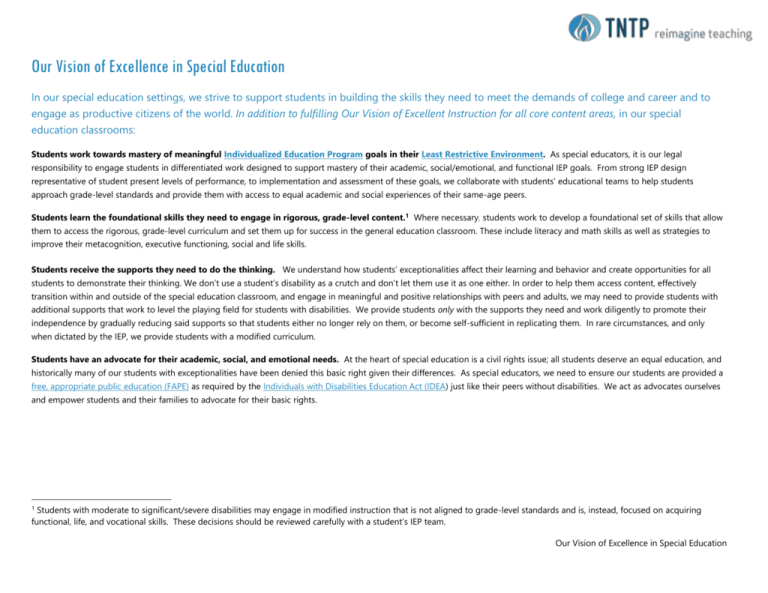
Our Vision of Excellence in Special Education In our special education settings, we strive to support students in building the skills they need to meet the demands of college and career and to engage as productive citizens of the world. In addition to fulfilling Our Vision of Excellent Instruction for all core content areas, in our special education classrooms: Students work towards mastery of meaningful Individualized Education Program goals in their Least Restrictive Environment. As special educators, it is our legal responsibility to engage students in differentiated work designed to support mastery of their academic, social/emotional, and functional IEP goals. From strong IEP design representative of student present levels of performance, to implementation and assessment of these goals, we collaborate with students’ educational teams to help students approach grade-level standards and provide them with access to equal academic and social experiences of their same-age peers. Students learn the foundational skills they need to engage in rigorous, grade-level content.1 Where necessary, students work to develop a foundational set of skills that allow them to access the rigorous, grade-level curriculum and set them up for success in the general education classroom. These include literacy and math skills as well as strategies to improve their metacognition, executive functioning, social and life skills. Students receive the supports they need to do the thinking. We understand how students’ exceptionalities affect their learning and behavior and create opportunities for all students to demonstrate their thinking. We don’t use a student’s disability as a crutch and don’t let them use it as one either. In order to help them access content, effectively transition within and outside of the special education classroom, and engage in meaningful and positive relationships with peers and adults, we may need to provide students with additional supports that work to level the playing field for students with disabilities. We provide students only with the supports they need and work diligently to promote their independence by gradually reducing said supports so that students either no longer rely on them, or become self-sufficient in replicating them. In rare circumstances, and only when dictated by the IEP, we provide students with a modified curriculum. Students have an advocate for their academic, social, and emotional needs. At the heart of special education is a civil rights issue; all students deserve an equal education, and historically many of our students with exceptionalities have been denied this basic right given their differences. As special educators, we need to ensure our students are provided a free, appropriate public education (FAPE) as required by the Individuals with Disabilities Education Act (IDEA) just like their peers without disabilities. We act as advocates ourselves and empower students and their families to advocate for their basic rights. Students with moderate to significant/severe disabilities may engage in modified instruction that is not aligned to grade-level standards and is, instead, focused on acquiring functional, life, and vocational skills. These decisions should be reviewed carefully with a student’s IEP team. 1 Our Vision of Excellence in Special Education Student Actions2 Engage in differentiated, individualized or small-group instruction that is aligned to grade-level standards and Individualized Education Programs (IEPs) Learn foundational literacy and math skills to comprehend worthwhile text and solve problems in the general education setting Demonstrate metacognition by using strategies across settings and reflecting on their approach to solving academic problems Practice and demonstrate important social and life skills within and outside of the classroom Engage meaningfully with the IEP team and related service providers across settings to access accommodations and modifications and meet academic, functional, social/emotional, and behavioral goals Persist through discussions and problem-solving tasks using functional mode of communication, which may include the use of augmentative or alternative communication systems Engage in rigorous texts/materials and challenging content in multiple ways, with or without the use of assistive technology and other supports Demonstrate independence by responding to increasingly complex directions and by implementing organizational and planning systems* Respond to appropriately complex tasks and activities independently Use visual supports and respond to teacher prompts (as needed) to execute transitions with little interruption to instructional time Track progress toward IEP goals with or without teacher support Demonstrate an understanding of rules and expectations by monitoring own behavior and/or by responding to positive behavior supports and interventions Use self-regulatory skills to manage behavior and emotions Embrace the needs of peers by providing them with the support and encouragement they need to meet their goals Demonstrate awareness of own academic, functional, social/emotional, and behavioral needs by discussing their strengths and areas of growth Advocate for their needs by requesting accommodations and supports, aligned with their IEP, that will allow them access to the same content as their sameaged peers Teacher Actions Collaborate with students’ IEP teams and related service providers to deliver differentiated instruction that is aligned to grade-level standards and/or IEP goals Use evidence-based practices for students with disabilities to teach foundational literacy and math skills as a pathway to grade level work Embed instruction on metacognitive strategies into content-based instruction to teach students critical memory and engagement processes they can use to access, retain, and discuss important content Promote student independence by modeling and practicing social and life skills Utilize students’ IEP teams and related service providers across settings to ensure students receive the necessary accommodations and modifications Provide multiple opportunities for students to engage in and respond to instruction using their primary mode of communication, which may include the use of augmentative or alternative communication systems Make rigorous texts, materials, content, and activities accessible to students through supplementary aids including annotated texts and assistive technology devices Gradually release supports to promote student independence Break down complex instructions and skills for students into smaller tasks Use visual supports and other prompts to support efficient transitions Monitor progress towards IEP goals and objectives and make adjustments to interventions accordingly Implement Behavior Intervention Plans (BIPs) that consider the function of students’ misbehavior Use positive behavior supports including individualized and class-wide behavior plans to prevent misbehavior Use de-escalation strategies to intervene safely and appropriately when students are in a crisis situation Create an inclusive learning environment that celebrates students’ unique needs Provide regular opportunities for students to discuss their strengths, areas of growth, needs, and progress towards short and long-term goals Teach, model, and practice assertive communication skills to support students’ ability to advocate for their needs Students with moderate to significant/severe disabilities may not demonstrate these student actions. Instead, students with moderate to significant/severe disabilities may engage in modified instruction that is not aligned to grade-level standards and is, instead, focused on acquiring functional, life, and vocational skills. These decisions and related actions should be reviewed carefully with a student’s IEP team. These actions may not be appropriate for students in early elementary grades (PK-3.) The educational team should consider the appropriate time and ways in which students in early childhood settings engage in these types of skills/activities. Our Vision of Excellence in Special Education 2

